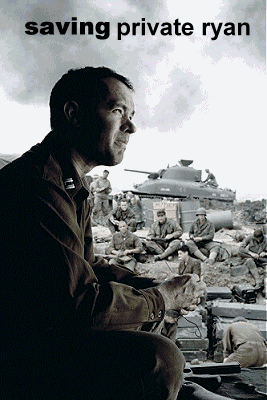
|

|

Jewish World Review August 14, 1998 / 22 Menachem-Av, 5758
Jonathan S. Tobin
Heroes? Do we even have any left? Looking around the American political and
cultural landscape, one could readily conclude that ours is not an age of
heroism. Though smashing icons has always been part of American politics and
culture, it has probably never been so prevalent as today. It seems as if we
live in a time where heroism, devotion to duty, and sacrifice are foreign to
our way of thinking. After Vietnam, Nixon, and now Bill Clinton, cynicism
seems to be the defining characteristic of the American voter.
And for proof of it, one need look no farther than the latest smash-hit
movie produced and directed by Steven Spielberg, "Saving Private Ryan." The World
War II movie, which depicts the bloody D-Day landing at Omaha Beach and a
fictional search for a lost soldier, has been packing the theaters and
playing to rave reviews. But aside from the graphic depiction of carnage and
suffering endured by the American soldiers who landed on the Normandy coast, what
struck me the most about this very good film was how conventional it was.
Take out the blood and gore (as well as the superior technical production)
and it was little different from all those old war movies that I saw as a child.
It seems as if our need for heroes — such as the ethnically diverse all-
American (though all white) squad of "Private Ryan" is still alive and
kicking. Americans wish to think well of themselves and there is no better
way to do that than to honor the veterans of the crusade against Hitler.
As the proud son of one of those veterans, I'll admit to taking pleasure in doing
so (the appearance at a crucial moment of the film of a P-51 "Mustang" fighter-
bomber -- the plane that my father served as a crew-chief for during his
three years of service in the 8th Air Force during the war -- gave me a special
thrill).
The post-Vietnam rejection of American patriotism is long past. "Private
Ryan" shows that it is permissible once again to celebrate America as a nation
dedicated to the cause of freedom rather than to concentrate solely on the
idea that it was born in sin and atrocity against blacks and Indians. To
cheer the flag which opens and closes Spielberg's film doesn't mean that we ignore
the troubling aspects of our history. It does mean that we choose to define
ourselves by our heroes and not our villains.
Judging by much of the literature and film one has seen coming out of Israel
in recent years, it appears at times to be going through its own painful
adolescence. Israel's cultural elite is very much caught up in the
passionate debates about the peace process which makes it unlikely we'll see any
patriotic blockbusters coming out of the Israeli film industry any time
soon.
Though the Israeli army remains a popular institution, Zionism which gave
the Zahal its purpose, is itself under fire.
Its blue and white pushkes are ubiquitous in Jewish life.
It is under attack these days because a growing segment of Jews — both in
Israel and here in America — no longer can abide its historic mission.
Namely,
redeeming the land. In the eyes of some like the Labor party's Yossi Beilin
it is an anachronism which is an embarrassment in this new age of Jewish
"post-Zionism." In press releases from left-wing Jewish groups and in
articles
in The New York Times, the JNF is now the evil landlord evicting a helpless
Arab family from their ancestral home in the Silwan district of Jerusalem
(which is also the historic site of King David's city).
This is ironic because it was only a few years ago that the JNF was under
attack from the Zionist right for being insufficiently interested in
supporting settlement in the territories. Now it is the left attacking the
JNF
for supporting settlement!
That the home in question is on land which is owned by the JNF, and
therefore
the entire Jewish people for whom it acts as representative, is not in
doubt.
The Ghuzlan family, who squat on the land and pose as the victims of Jewish
perfidy—themselves sold the land more than 70 years ago. Their fraudulent
claim dates back to the time from 1948-1967 when half of Jerusalem was
occupied by Jordan and Jews were forbidden to live in the part of Jerusalem
(the historic City of David) where the house is located.
The courts ruled on this issue, but that doesn't seem to matter to the left-
wingers who support the Ghuzlans. That the Ghuzlans are trying to cheat the
Jewish people out of a piece of Israel doesn't matter, as Shlomo Gravetz,
head
of the JNF in Israel, neatly put it. Nor are they interested in the plight
of
the family -- who are land speculators and would probably love to accept a
generous settlement from JNF but are prevented from doing so by the threat
of
retribution from Yasser Arafat's Palestinian Authority who want the
controversy to continue. What they don't like about it is that the JNF is
asserting Jewish ownership to land claimed by Arabs (especially land Arafat
would like to use as a future capital of "Palestine"). This doesn't amount
to
"transfer" or treating Arabs unfairly. It does mean that the JNF — the
heroic
institution of Zionism — is now seen as somehow immoral because it defends
the
rights of the Jewish people to Jerusalem.
Indeed, the idea of trying to bring Jewish life back to all parts of the
country, including the Galilee and the Negev, is also under attack. Some now
see this process of Jewish return as "racist" and inconsistent with a value
system that no longer views Zionism as a righteous cause.
Jewish self-loathing on Jerusalem
That this notion is rejected by most Israelis goes without saying. But a
nation whose raison d'etre is called into question by much of its academic
and
cultural elite has serious problems. What matters here is not so much the
details of the legal ownership of one plot of land (infuriating as the
misinformation being put about JNF's foes is). The point of the controversy
is
that trashing institutions for political reasons will exact a cost. If JNF
goes, a lot that we cherish will go with it.
If, in a fit of self-loathing, we sacrifice the JNF, a lack of heroes will be the least of our problems. Like the
flag which waves over the graves of heroes in "Private Ryan," the JNF is worth
 Holding on to our heroes
Holding on to our heroes
A FEW YEARS AGO, while conducting an interview for a story about American
volunteers in Israel's War of Independence, one of the veterans stopped me
with an interesting observation. He said he was worried that the only thing
Jewish youngsters were learning about was "degradation and humiliation."
Why, he wondered, weren't we providing them with more stories of Jewish
heroism?
Patriotism is back at the movies
 What's more, the values for which our heroes once stood are themselves often
called into question. And of all those values, it is patriotism which is
often considered the least fashionable and the hardest to defend. Yet despite all
of our debunking, the hunger for heroes remains.
What's more, the values for which our heroes once stood are themselves often
called into question. And of all those values, it is patriotism which is
often considered the least fashionable and the hardest to defend. Yet despite all
of our debunking, the hunger for heroes remains.
Where are our Jewish heroes?
But what of the Jewish heroes? In a year when we are celebrating the 50th
anniversary of the re-birth of Jewish sovereignty in the Land of Israel
(handed to us, as Natan Alterman's poem put it, on the "silver platter" of
those who died in the War of Independence), there should be talk of little
else but heroes. Though the veterans of that war have been recognized, there
is also a tone of cynicism that seems to permeate Jewish discourse about
Zionism these days that is disquieting.
Blasting Zionist "Mom and apple pie"
The principal target this month is the most venerable of Zionist
institutions: the Jewish National Fund (JNF). The JNF is pretty much the Mom and apple pie
of Zionism. It is the fund founded by Theodor Herzl to buy back the Land of
Israel to provide a home for the Jewish people in the land of their
ancestors.
JWR contributor Jonathan S. Tobin is executive editor of the Connecticut Jewish Ledger. He was
the recipient of the American Jewish Press Association highest award: First
Place in The Louis Rapoport Award for Excellence in Commentary and Editorial
Writing. The Rapoport award is named for the longtime editor of the
Jerusalem Post and was given to Mr. Tobin at the AJPA's 1997 Simon Rockower Awards dinner
in Cleveland on June 18, 1998.
8/07/98: Three strikes, but they continue to play
7/23/98: Zionist vs Zionist
7/17/98: Summer news stories: Large and small
7/13/98: A step closer to school choice
6/26/98: The Holocaust Museum and Mort Klein
6/12/98: What price Jewish education?
6/5/98:
Ten books for a long, hot summer:
A serious vacation reading list for Jewish history lovers
5/29/98:
Double standards here and there:
Hypocrisy raises its ugly head in Israel and the U.S.
5/26/98: Hartford Seminary tangle points to bigger issues
5/22/98:The importance of being Bibi
5/14/98:
The ‘dream palace' of the anti-Zionists:
Hartford Seminary controversy has historic roots
4/26/98: All-rightniks versus the alarmists:
Focussing on the Jewish bottom line
4/13/98:Of ends and means and victims
4/5/98: Hang up on Albright
3/29/98: Bigshots or activists?: Clinton's three clerics return from China
3/27/98: Will American Jews help Clinton push Israel into a corner?
3/22/98: Anti-Semitism then and now
3/15/98: Still searching for Jews at the opera
3/11/98: Remembering Eric Breindel
3/8/98: Getting lost in history
3/5/98: Follow the money to Hamas
2/22/98: Re-writing "Anne Frank" - A distorted legacy
2/15/98: Religious persecution is still a Jewish issue
2/6/98: A lost cause remembered (the failure of the Bund)
2/1/98: Economic aid is not in Israel's interest
1/25/98: Jews are news, and a fair shake for Israel is hard to find